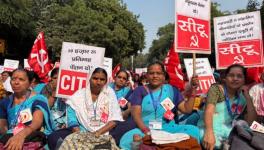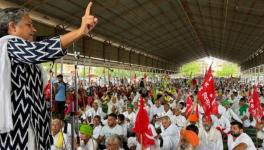Nov 26 Strike: ‘It is a Question of Our Existence,’ Say Workers in Delhi-NCR

New Delhi: Workers of the world, unite! This famous slogan is finding new resonance among workers of the organised and unorganised sectors, including construction, banking, manufacturing and service in Delhi NCR region, who are gearing up for the historic strike on November 26.
The strike, called by all major trade unions except Rashtriya Swayamsewak Sangh-affiliated Bharatiya Mazdoor Sangh, in close coordination with more than 300 peasant organisation is meant to press for abolishing four labour codes, which the unions allege, will deprive millions of workers of their basic rights and benefits including the hard fought eight-hour work day.
The unions are also demanding a minimum wage of Rs.21,000 per month; assured pension of Rs.10,000 per month; 10 kg of foodgrain to all needy families and strengthening of public distribution system and halt to disinvestment of key public sector undertakings, such as Air India and Bharat Petroleum.
Backing the farmer organisations, the workers are also asking for review of three farm laws introduced by the Narendra Modi government that deprive the farmers from any guarantee about the minimum support price as also dismantling the organised markets, also known as Agriculture Produce Marketing Committee, which many believe would lead to corporate takeover of agriculture.
A conversation with the leaders of trade unions suggest that the historic strike is a culmination of simmering anger and anguish among the workers caused by consistent anti-worker policies, notably demonetisation and an ill-devised lockdown which forced migrant workers to return to villages, leaving many of them penniless and jobless.
Anurag Saxena, Secretary, Centre of Indian Trade Unions (CITU) Delhi unit, said workers were left to literally starve after the owners did not pay during lockdown and government failed to come up with any promising assistance.
Talking to NewsClick, Saxena said: “The workers are angry because they were abandoned by both the government and their employers, when they needed them most. First, a worker was forced to migrate. When s/he came back, s/he is not getting the wages necessary to make a living which importantly includes education for children. Yes, anger is simmering for long. There was already an uncertainty over prospects of getting an employment. Now, if you are a vendor, the police and municipal corporations are threatening to evict. Construction sector workers are not finding work daily. Above all, if you live in a city, you need to pay rent as well. So, the struggle to survive has become more difficult.”
Saxena argued that the labour codes introduced by the Centre are adding salt to the wounds of the workers, as these seek to abolish the minimum guarantees ensured to workers after decades of struggle. The new labour codes have removed provisions like setting up of labour courts which are instrumental in settling a labour dispute over issues of payment and compensation.
“Who will settle the cases if the contractors fail to pay workers? The codes are reducing the powers of labour inspectors and making them mere facilitators. Which factory owner will care on his complaints? Now, there will be no payment for over time and workers can be made to work for 12 hours. Most importantly, it is blow on the collective bargaining. The government is changing the rules to form a union. Currently, only seven employees could form a union. Now, the eligibility has been revised to 100 employees or 10% of the working strength,” he said.
Saxena said that the strike on November 26 will be joined by unorganised sector workers, including Auxiliary Nurse Midwives (ANM), street vendors, scheme workers and construction workers along with banking and insurance employees, defence and railway workers and deliver a clear message ‘perform or perish’.
Virender Dangwal, another workers’ leader from Faridabad, told NewsClick that they have been campaigning relentlessly in the industrial areas and were getting enthusing response from workers for the general strike call. The workers have planned to take out a March in these areas in the evenings after observing a day-long strike.
Dangwal said: ”It is a question of existence for us. We saw our worst horrors coming true. The employees who have been working for 15 years were asked to quit their jobs without any gratuity and leave encashment. When they approached the labour office, they always found closed doors. Who will listen to us if not the labour office? The labour codes are giving a free hand to suck workers blood out of their bodies and throw them lifeless without hope.”
Describing the “hellish” working and living conditions of workers, Dangwal said: “Exploitation has reached such stark levels where employers do not want to spend a penny on worker welfare. One can visit any construction site in Faridabad and see how many toilets were built either by government or employers. They do not even want to spend money on soaps for workers so that they can clean themselves after their work.”
Gangeshwar Dutt Sharma, President, CITU, Noida said: ”We will not relent until the codes are scrapped and the workers are given their just due.”
Sharma said there have been consistent efforts to dismantle construction workers welfare boards. Once registered, a worker can get compensation for accidental death, aid for daughters’ marriage and pensions. Similarly, the vendors have been ensured through law that they would not be evicted until they are registered. “We are demanding a living salary and basic right and that’s why we will make this strike successful because it is a matter of our survival,” Sharma concluded on a determined note.
Get the latest reports & analysis with people's perspective on Protests, movements & deep analytical videos, discussions of the current affairs in your Telegram app. Subscribe to NewsClick's Telegram channel & get Real-Time updates on stories, as they get published on our website.
























